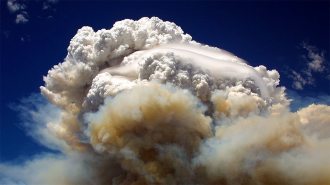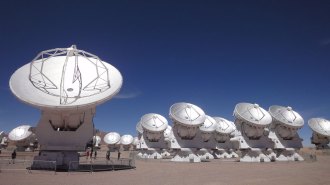News
-
 Humans
HumansAre researchers asking the right questions to prevent mass shootings?
Understanding how to thwart these violent events may be more effective than analyzing perpetrators’ backgrounds.
By Bruce Bower -
 Physics
PhysicsExploding stars scattered traces of iron over Antarctic snow
Researchers melted half a ton of snow to find just 10 atoms of a radioactive variety of iron.
-
 Life
LifeHow these tiny insect larvae leap without legs
High-speed filming reveals how a blob of an insect can leap more efficiently than it crawls.
By Susan Milius -
 Earth
EarthThe worst wildfires can send smoke high enough to affect the ozone layer
Pyrocumulonimbus clouds can send soot and other damaging particles 23 kilometers into the air
By Megan Sever -
 Climate
ClimateMercury levels in fish are rising despite reduced emissions
Climate change and overfishing can increase how much mercury accumulates in fish, counteracting efforts to reduce human-caused emissions.
-
 Astronomy
AstronomyGiant, active galaxies from the early universe may have finally been found
Overlooked galaxies from when the universe was younger than 2 billion years old could be the ancestors of other ancient and modern monster galaxies.
-
 Health & Medicine
Health & MedicineRacist words and acts, like the El Paso shooting, harm children’s health
Racism can take a lifelong toll on children’s and adolescents’ health. U.S. pediatricians are tackling the problem.
-
 Science & Society
Science & SocietyHow the 5 riskiest U.S. cities for coastal flooding are preparing for rising tides
The five U.S. cities most at risk of coastal flooding from rising sea levels are in various stages of preparedness.
-
 Anthropology
AnthropologyAncient Maya warfare flared up surprisingly early
Extreme conflicts broke out well before the decline of the Maya civilization, researchers say.
By Bruce Bower -
 Earth
EarthDecades of dumping acid suggest acid rain may make trees thirstier
Acidified soil loses calcium, which can affect trees’ ability to hang on to water.
-
 Climate
ClimateThe Arctic is burning and Greenland is melting, thanks to record heat
A heat wave is melting Greenland’s ice and fueling blazes across the Arctic that are pumping record amounts of carbon dioxide into the air.
-
 Health & Medicine
Health & MedicineHospitalizations highlight potential dangers of e-cigs to teens’ lungs
E-cigarette use can harm the lungs, and eight Wisconsin teens who developed severe lung injuries after vaping may be the latest victims.